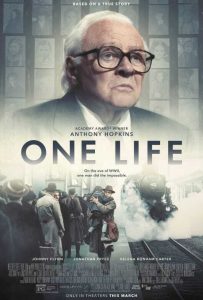
“One Life”
(UK)
Metacritic (6/10), Letterboxd (3/5), Imdb.com (6/10), TMDB.com (6/10)
For some of us, there’s no stopping when it comes to seeing through on a mission of vital importance. So it was in 1938, when a dedicated English stockbroker selflessly enabled the successful escape of 669 children (mostly Jewish) from Prague not long after the Third Reich “annexed” Czechoslovakia’s Sudetenland region, the first step toward Germany’s invasion of the country and the eventual onset of World War II. British-born Nicholas Winton (Anthony Hopkins), the descendant of German Jewish ancestors, and members of the British Committee for Refugees from Czechoslovakia both on the ground and in London worked tirelessly against seemingly impossible odds to facilitate the youngsters’ flight to freedom. In particular, Winton’s younger self (Johnny Flynn) and his determined mother (Helena Bonham Carter) battled a reluctant British bureaucracy, intolerant prejudicial attitudes and border-crossing obstacles to arrange protective train transport across Europe to secure the safety of the young refugees. But, for all of Winton’s successes, he felt remorse that he was unable to do more, especially when he looked back on what he accomplished 40 years after the fact. Thankfully, his efforts didn’t go unnoticed, at last receiving the recognition for what he did, earning him the gratitude of the survivors and the honors of a grateful nation, in essence becoming the UK’s counterpart to Oskar Schindler. Director James Hawes tells a compelling story in his debut feature film, though the execution, regrettably, could use some shoring up, especially in the film’s sluggishly paced, overly talky and occasionally meandering opening half. The picture’s back end, however, considerably makes up for these deficiencies, evoking genuine, well-earned, heartfelt emotions, qualities that could have made for a better release overall if they had been employed more fully earlier on. This is largely made possible by the powerful performances of Hopkins, Flynn, Bonham Carter and a host of supporting players, along with fine period piece production values. “One Life” ultimately delivers a message that we could all stand to hear more often, not only in supporting monumental undertakings like those depicted here, but also in being giving of ourselves in general, no matter how great or small the efforts or ventures might be. The world would certainly be a better place for doing so – and for the work of the Nicholas Wintons that reside within all of us.




Leave A Comment